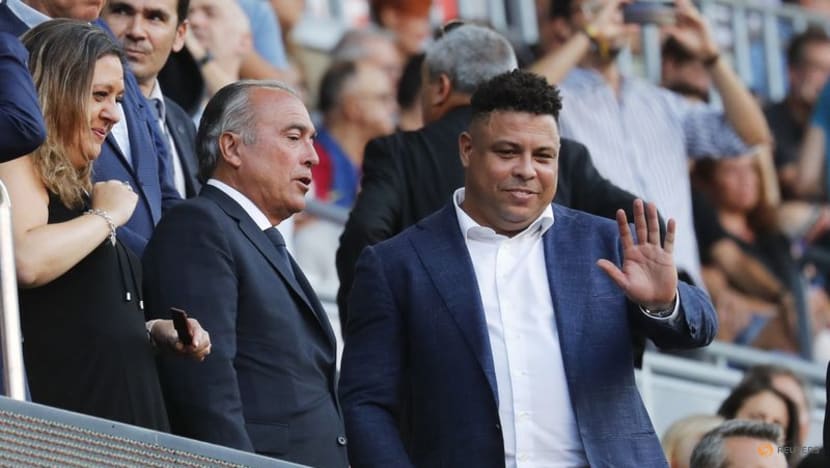Brazilian legend Ronaldo Nazário has officially ended his chapter as majority owner of Real Valladolid, selling his stake to a North American investment group. The move comes in the wake of the club’s third relegation under his tenure, marking a dramatic and sobering end to a six-year ownership journey filled with ambition, setbacks, and unfulfilled promise.

A dream built on legacy
When Ronaldo purchased a controlling share of Real Valladolid in 2018, it was hailed as a romantic return to football — not as a player, but as a businessman and visionary. The World Cup-winning striker, widely regarded as one of the greatest to have ever played the game, took on the challenge of leading a modest Spanish club to stability and growth.
With charisma, footballing knowledge, and an aura of invincibility, Ronaldo injected fresh energy into Valladolid. His goal was clear: to turn the club into a sustainable project that would regularly compete in LaLiga, all while modernizing its infrastructure and business operations.
For a time, it seemed his influence was paying off. The club maintained top-flight status for two consecutive seasons after his arrival, and his presence alone boosted Valladolid’s international profile. Commercial partnerships grew, and the club appeared to be on an upward trajectory.
Relegations and reality checks
But football is rarely scripted, and Ronaldo’s tenure has been anything but a fairy tale. Valladolid’s most recent relegation — confirmed in April with one match left in the season — is the third under his ownership. The club currently sits bottom of the table with a meager 16 points, having suffered a staggering 29 defeats this season.
This decline was particularly sharp and painful. From tactical misfires and injuries to inconsistent leadership on and off the pitch, the problems mounted faster than they could be solved. Despite efforts to strengthen the squad and introduce a more data-driven management model, results simply did not follow. The most recent relegation served as a breaking point. With mounting pressure and dwindling returns, Ronaldo made the decision to sell, signaling the end of a project that once carried great promise.
A quiet exit amid a shifting strategy
The sale of Ronaldo’s majority stake to a North American investment group was confirmed by Real Valladolid in a brief announcement. While the financial details were not disclosed, the change in ownership reflects a broader trend in global football, where American investors continue to increase their footprint in European clubs.
Ronaldo himself has not made a public statement about the decision, but those close to the situation suggest that the 48-year-old had grown disillusioned with the operational challenges and sporting instability. The decision also mirrors a similar move last year when he sold his majority stake in Cruzeiro, the Brazilian club where he began his professional career.
It appears that Ronaldo is stepping away from active club ownership altogether — at least for now. Whether this marks a complete shift away from football investment or simply a pause remains to be seen.
The legacy he leaves behind
Though the results on the pitch were far from ideal, Ronaldo’s impact on Valladolid wasn’t entirely negative. His era brought renewed visibility to the club and moments of top-flight excitement that might not have occurred otherwise. His efforts to professionalize club operations, improve facilities, and expand the brand cannot be overlooked.
Valladolid’s fanbase remains divided. Some will remember Ronaldo as the ambitious dreamer who tried to elevate the club beyond its modest means; others will see his tenure as one of missed opportunities and unstable leadership. Ultimately, his legacy will be judged not just by league standings, but by the foundation he leaves behind. The question now is whether the new ownership group can build upon that foundation or will need to start over. The fans will be watching closely, hoping for a more stable and successful future.
A larger question about football legends as owners
Ronaldo’s departure also contributes to a larger conversation about former players transitioning into football executives and club owners. While names like Ryan Reynolds and Rob McElhenney at Wrexham have enjoyed success with a very different model, Ronaldo’s tenure serves as a reminder that fame and footballing intelligence don’t always translate to sustained success in management or ownership.
The pressures of running a club — especially one without the financial muscle of a top-tier giant — are immense. Balancing budgets, navigating league politics, and maintaining fan support while striving for promotion is an art form in itself, often unforgiving even for the game’s brightest minds.
Still, Ronaldo’s willingness to invest in football beyond his playing days deserves recognition. He could have opted for a passive role in the sport’s glamorous fringes but instead chose to engage in the complex, gritty reality of club management. With Valladolid relegated and Ronaldo stepping away, the club enters a new phase — one of uncertainty, but also potential. Whether the incoming American investors will prioritize quick promotion, long-term stability, or commercial growth remains to be seen.
As for Ronaldo, he departs the project with lessons learned and a legacy that, while flawed, reflects both the potential and the pitfalls of football ownership. His ambition was never in doubt; it was the execution — and perhaps the context — that proved more challenging than expected. Regardless of where his next venture takes him, Ronaldo’s time at Valladolid adds another layer to his multifaceted football journey — from legendary striker to risk-taking owner, and now, perhaps, reflective veteran of the game’s unforgiving business side.




